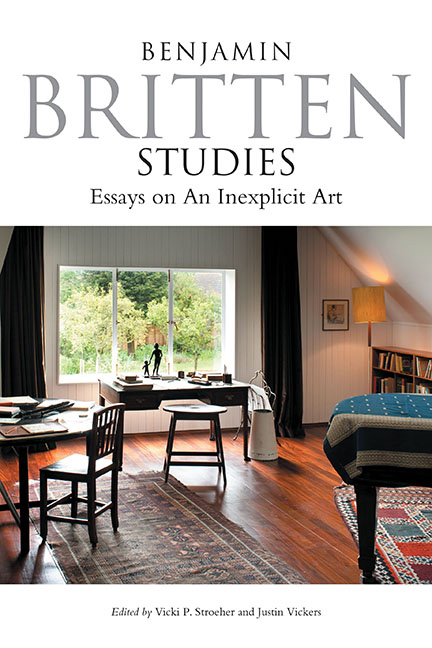Book contents
- Frontmatter
- Dedication
- Epigraph
- Contents
- List of Illustrations
- List of Musical Examples
- List of Tables
- Notes on Contributors
- Acknowledgements
- Bibliographic and General Abbreviations
- Editors’ Preface
- Introduction: Writing About Britten
- Part I Identity: Exile and Return
- 1 The Shock of Exile: Britten and the American Years
- 2 Britten, Paul Bunyan, and “American-ness”
- 3 Collaborating with Corwin, CBS, and the BBC: Britten's Re-entry into British Radio in 1942
- 4 An Empire Built on Shingle: Britten, the English Opera Group, and the Aldeburgh Festival
- Part II Britten and Intimacy
- Part III Britten and His Craft
- Part IV Britten and Matters of Practicality
- Conclusion and Epilogue
- Works Cited
- Index
2 - Britten, Paul Bunyan, and “American-ness”
from Part I - Identity: Exile and Return
Published online by Cambridge University Press: 25 October 2017
- Frontmatter
- Dedication
- Epigraph
- Contents
- List of Illustrations
- List of Musical Examples
- List of Tables
- Notes on Contributors
- Acknowledgements
- Bibliographic and General Abbreviations
- Editors’ Preface
- Introduction: Writing About Britten
- Part I Identity: Exile and Return
- 1 The Shock of Exile: Britten and the American Years
- 2 Britten, Paul Bunyan, and “American-ness”
- 3 Collaborating with Corwin, CBS, and the BBC: Britten's Re-entry into British Radio in 1942
- 4 An Empire Built on Shingle: Britten, the English Opera Group, and the Aldeburgh Festival
- Part II Britten and Intimacy
- Part III Britten and His Craft
- Part IV Britten and Matters of Practicality
- Conclusion and Epilogue
- Works Cited
- Index
Summary
Between 1939 and 1941, when Britten and Auden conceived and produced Paul Bunyan, there was a decided lack of consensus among American composers and critics regarding what “American-ness” in music entailed. This chapter addresses the debate in the late 1930s and early 1940s over the notions of a distinctly American style in art music and examines the complicated relationship of Britten and W. H. Auden with Americanness in Paul Bunyan, the work Britten thought his most American. One tendency of American composers, among many, was to embrace a musical isolationism that was steeped in nationalism and favored American-born composers over imports. This intensely nativistic approach would have hardly provided a fertile soil for a Briton's approach to Americanism, despite nods to such jingoistic American fare as jazz and folk music in the work. But neither did Britten's Paul Bunyan conform entirely to a movement toward European models, traditional or experimental, thought by many the best means by which American composers could gain an international stature commensurate with that of their European colleagues. Although in the majority of his works written during this time Britten best fit within the anti-nationalist, non-experimental composers, his approach in Bunyan was too eclectic to find a refuge in that quarter. In many respects, Britten's and Auden's Paul Bunyan could not be more American, but their perception of America failed to carve out a singular niche within the prevailing notions of American identity, musical or otherwise. Indeed, Britten's music runs the gamut of the contemporary debate from nationalism to experimentalism, while Auden's libretto explores high and low styles from Broadway, radio, and the serious stage. Despite Britten's and Auden's efforts to create a work that would garner entry into the American cultural scene with a conscious expression of a decidedly American sense of self, their Paul Bunyan was not fully American by virtue of the nationality of its creators, nor wholly foreign because of its subject matter and musical content. Britten's and Auden's attempts to express American-ness situate the work squarely within – and yet still outside – the contemporary musical atmosphere of the United States.
- Type
- Chapter
- Information
- Benjamin Britten Studies: Essays on An Inexplicit Art , pp. 33 - 58Publisher: Boydell & BrewerPrint publication year: 2017



